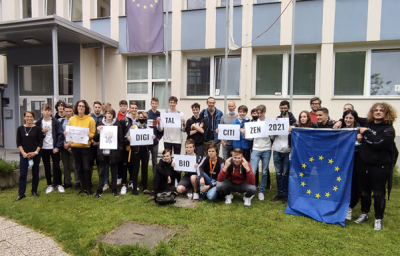Description
The challenge of the project week was how to work together, collaborate & co-create on the topic of nature (BiodiverCities) in order to develop apps for learning about nature in our environment as well as mapping nature, all in a fun and attractive way. We organized a program for the regional school project week where we established inter-institutional cooperation and involved key stakeholders for active cooperation of different levels from the local community, national level & EU level. This resulted in the institutionalization of the developed and tested program since it is included in the curriculum for 2022.
BiodiverCities project initiated the cooperation of the school and municipality. Together, teachers, the expert and municipality representative co-designed and co-developed the programme and workshop activities. Groups of students participating in Digital Biocitizen workshop independently co-created digital solutions for learning about nature and mapping nature in the city. This was also their first time to deal with the topic in the school as well as the mode of co-creative work in groups. Moreover, this activity as part of BiodiverCities project will inform the policies on biodiversity and citizen engagement, and deliberative democracy. Next, we will share this experience with other EU cities and institutions. With the project Digital BioCitizen we supported mainstreaming participatory practices in public institutions, greening cities with citizens, and in our case sensitizing students about biodiversity and active citizenship. By initializing this participatory process we stimulated institutional change. The exchange of knowledge & co-creation of civil servants, practitioners, citizens, and EU officials bring sustainable impact and changes in curriculum and changes in institutional practices. BiodiverCities Maribor increases the awareness of the underpinning role of urban biodiversity by setting up citizen engagement activities. The results of DigitalBioCitizen action will help to understand better how to involve citizens in making cities greener and more biodiverse.
When and Where
Policy Context
Participants
teachers,
expert in biodiversity and landscape architecture,
city public administration and public company
JRC - European Commission (endorsement)
School leadership
Methodologies
developing the process of the workshop, developing agenda, 3 day activity, evaluation
Impact
Digital BioCitizen 2022 was presented to EU cities and included in the official report:
https://drive.google.com/file/d/1KTgje3Bx4TBd5C_-uUJeMrsYe5Y7zolZ/view?usp=sharing
Lasting achievement:
3 teachers implemented a new approach to teaching by introducing biodiversity as a topic for a challenge.
One generation of students of technical sciences was introduced to the topic of biodiversity as a potential topic for the development of business ideas.
Assessment
We had no additional funding for this activity. We managed to build a project fund (for rewards: tickets for outdoor minigolf, tickets for swimming pool on nature protected island on Drava river- Pilot location, young rooted plants with care instructions, usb keys, pens),
Time constraints: all participants co-developing the Digital BioCitizen program have their regular duties and this was an additional activity for which we had to secure additional time to prepare everything on time since the students also have their regular duties and additional exams in the last period. Together we prepared the agenda for the Project-week programme design and workshop itinerary in an optimal way.
- Institutional cooperation between the school and the city showed that there are possible benefits of cooperation for the school and for the community.
- Informal networks enabled trust between the actors in and between institutions. Personal approach to institutional actors in city administration and the school management enabled endorsement for this activity.
- Secure and plan the time for the development of citizen engagement activities
- Placing the process under an institutional umbrella such as an EU policy might be perceived as trustworthy and enhance the cooperation
